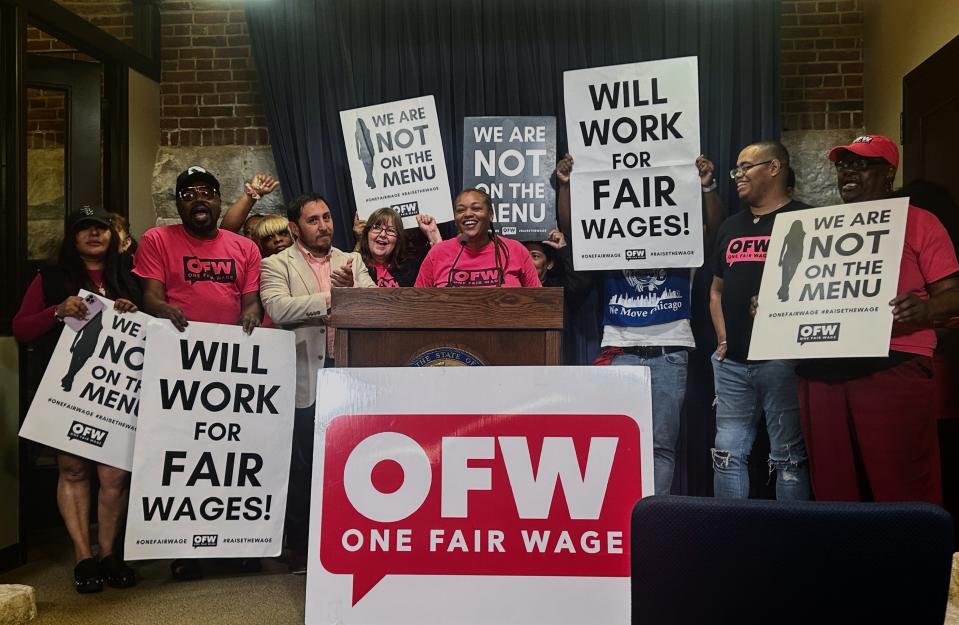Efforts to end subminimum wage for tipped workers in Illinois stalls, disabled workers advancing
While some disabled and tipped workers have called for improved pay this session, obstacles remain in passing legislation this session despite progress being made.
Two bills now held in the Illinois House would prohibit businesses from paying employees a subminimum wage and instead have them paid the minimum wage, rising to $15 an hour starting next year. Both, however, have encountered resistance from lawmakers and business groups alike who claim it will force them to rise prices to cover the higher wages.
More: 'Solution to a problem that does not exist': Restaurants oppose bill ending tipped wage
Rep. Lisa Hernandez, D-Cicero, stands by her legislation that would end the tipped wage of $8.40 per hour and replace it with the full minimum wage plus tips. The bill passed out of committee in April despite some opposition within her party, hoping that increased conversation would allow for an agreement to be reached. On Tuesday, she told reporters those negotiations on House Bill 5345 will continue this summer.
"I believe that we made great strides toward a bill that is good for everyone, bridging the interests of restaurant workers and restaurant owners," she during a press conference. The Illinois Restaurant Association has been staunchly opposed to the measure.

Your turn: Illinois restaurant industry at risk if lawmakers pass new legislation
On Monday, the same committee passing HB 5345 took action on a bill that would keep Illinois businesses from participating in a federal program that allows them to pay individuals with disabilities below the minimum wage.
It's the latest attempt from bill sponsor Rep. Theresa Mah, D-Chicago, to move this legislation which similarly encountered resistance last year. An amendment to her bill, House Bill 793, would permit businesses to participate in the federal Fair Labor Standards Act through Dec. 31, 2029 instead of the original July 1, 2027. After that, disabled workers would be paid at least the state minimum wage.
Other amendments include the creation of a task force to study what businesses are using the 14(c) certificates and how many workers are paid under minimum wage. By July 1, 2025, the task force is required to submit their report to the governor's office. According to the Illinois Department of Human Services, more than 3,200 disabled workers hold these certificates as of May 1.
Doug McDonald, CEO of Sparc, a Springfield-based nonprofit serving people with intellectual disabilities said during committee that the changes quelled his concerns, a more gradual transition providing the necessary safeguards for businesses with disabled safeguards.
"As a provider, I feel very, very comfortable in asking you to pass this bill," he told lawmakers. "We can make it work; the tools are there."
Mah is hoping lawmakers will keep $2 million funding for the Illinois Department of Human Services in the upcoming state budget to administer a transition grant program. Gov. JB Pritzker included the funding in his budget proposal and previously signed an executive order executive order in October 2021 preventing the state from entering into contracts with entities that pay disabled workers less than the minimum wage.
More: 'Only so much to go around': Spending demands mount as Illinois lawmakers craft budget
The funding and other amendments is still insufficient said Rep. Charlie Meier, R-Okawvillle, who believes passage of the legislation of the legislation would lead to thousands of disabled workers losing their jobs.
"This bill has come a long way from where it was last year. Do I believe it's a great bill yet? No," he said. "If we take workers in this program right now and we take them off subminimum wage, there's more than $30 million missing in those paychecks."
The bill returned to committee on Wednesday, where it appears more consensus is brewing with less groups filing formal opposition. If the House votes on it today, the possibility remains for the bill to pass before scheduled adjournment on Friday.
Lawmakers are scheduled to be in Springfield through Friday, but the door remains open for extra session days to be added next week. Their next opportunity to pass outstanding legislation would come during the fall veto session, which would require three-fifths majorities in the House and Senate to have an immediate effective date.
Jerry Nowicki of Capitol News Illinois contributed to this report.
Contact Patrick M. Keck: 312-549-9340, pkeck@gannett.com, twitter.com/@pkeckreporter.
This article originally appeared on State Journal-Register: Bill raising minimum wage for tipped Illinois workers stalls. What next?

